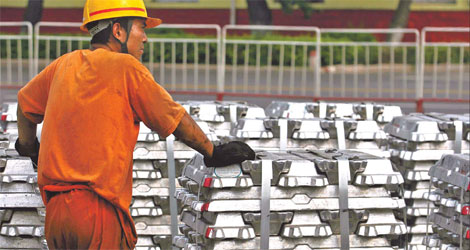Top Biz News
Chalco sees rosy 2010 after rough year
By ZHOU YAN (China Daily)
Updated: 2010-03-30 09:38
 |
Large Medium Small |
|
 |
|
A worker loads imported aluminum at Qingdao Port, Shandong province. Chalco projects global aluminum prices will fluctuate between $2,000 and $2,400 per ton for 2010, and between 15,500 yuan and 18,000 yuan per ton in the Chinese market. [China Daily] |
SHANGHAI -- Aluminum Corp of China Ltd (Chalco), the largest producer of the metal in China, has moved into the black in the first two months of this year after posting a loss in 2009, buoyed by price hikes for the metal and effective cost-cutting measures.
"We've seen a distinct improvement in our sales revenue and operating results due to recovering market demand and reduced production costs," Chairman Xiong Weiping said on Monday, without disclosing detailed figures.
Chalco, one of the world's largest aluminum and alumina producers, posted a worse-than-expected net loss of 4.64 billion yuan ($680 million) in 2009, compared with a net profit of 19.5 million yuan a year earlier.
| ||||
Chalco projects global aluminum prices will fluctuate between $2,000 and $2,400 per ton for 2010, and between 15,500 yuan and 18,000 yuan per ton in the Chinese market.
Chalco is a world leader in the production of both alumina and aluminum. Aluminum oxide, commonly referred to as alumina, is used in the production of aluminum metal and also used as an abrasive due to its hardness.
Global alumina consumption is expected to hit 78.4 million tons this year, while domestic markets are forecast to gobble up 35 million tons in 2010.
China will import 4.2 million tons of alumina this year, Xiong estimated.
Chalco produced 7.78 million tons of alumina and 3.44 million tons of aluminum in 2009. This year the company hopes to raise production of alumina by 30 percent and aluminum by 10 percent.
Xiong said that he is confident the company will improve its performance this year on a recovering economic environment.
"We estimate Chalco will be profitable this year given the still robust growth in the real estate and auto sectors," said Zhu Lida, a non-ferrous analyst at Northeast Securities in Shanghai.
Zhu is projecting the company's earnings per share will reach 0.015 yuan this year, compared with 2009's minus 0.34 yuan per share.
The top regulatory body has approved Chalco's plan to raise up to 10 billion yuan in a March share placement to develop alumina projects mainly in Chongqing and Zunyi, Guizhou province, that will generate 2.35 million tons of production capacity per year.
Analysts said that the company would directly reduce its financial costs through the private placement.
In addition, Xiong said that Chalco is also actively seeking bauxite exploration opportunities overseas, with the goal of securing the company's natural resource supply.
"We will also be exploring investment opportunities abroad to establish large-scale alumina factories," Xiong said.
Chalco's parent company Chinalco signed a $2.9 billion agreement this month with Anglo-Australian miner Rio Tinto to jointly develop an iron-ore project in the West African nation of Guinea after an earlier deal between the two - valued at $19.5 billion - fell through.
Chalco's A-shares rose 1.87 percent to close at 13.1 yuan on Monday.
The company's products are used in construction, electrical, packaging, transportation, non-durable consumer goods, petrochemical, and aerospace industries.













